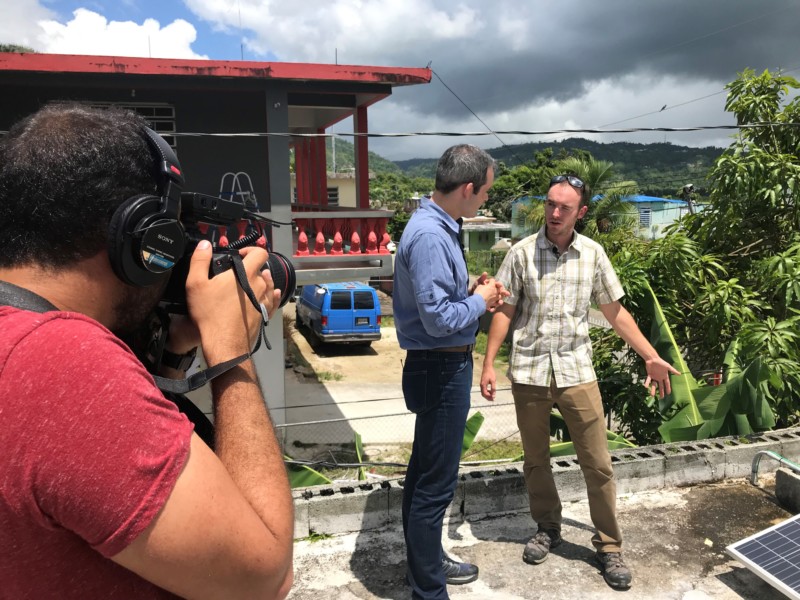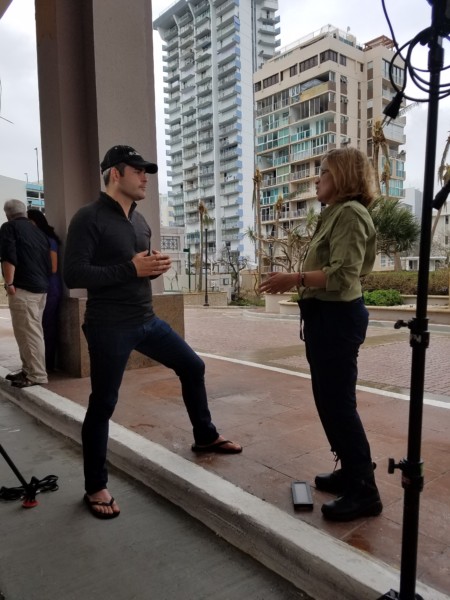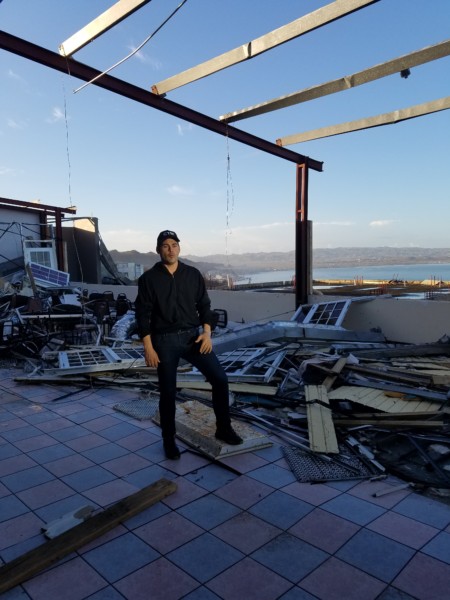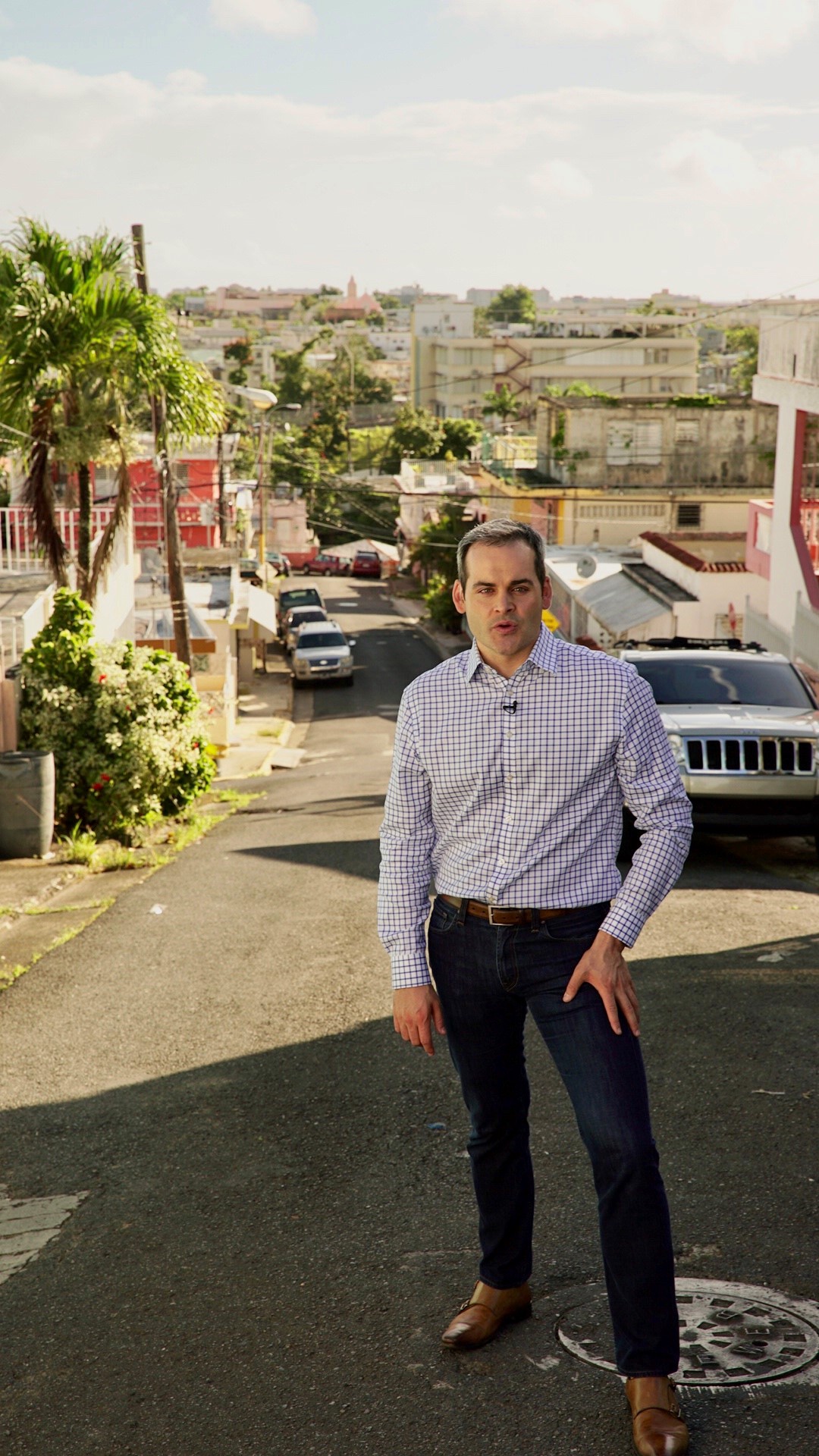Just 48 hours before the start of hurricane season, CBS Correspondent David Begnaud was back in the US territory of Puerto Rico, reporting about a Harvard study that estimates the number of deaths linked to Hurricane Maria at more than 4,000. (The Puerto Rican government now estimates the number of dead at around 1,400.)
Begnaud made a name for himself by relentlessly covering the island when few others did, before, during, and in the months after the devastating hurricane which hit the island and other parts of the Caribbean last summer. Even while on assignment for other topics, Begnaud has continued to report on the ongoing recovery efforts, and the thousands of homes still without power. His Facebook posts often draw hundreds of comments and thousands of shares. Despite being an outsider with no roots to Puerto Rico, Begnaud’s work has earned him a level of respect, admiration, and loyalty in the community that few other reporters or news organizations can match.
CJR spoke to Begnaud on phone while he was in Puerto Rico in late May, shortly before this year’s hurricane season began on June 1. This conversation has been edited and condensed for clarity.
RELATED: After new death toll report Friday, Sunday TV ignores Puerto Rico
What was the moment that you decided that you needed to go back to the island? Was this trip planned ahead of this year’s hurricane season or something you were planning to do for a while?
When the headline came out [on May 29] that a Harvard study estimated that 4,600 people had died, my bosses got to me before I could even put my fingers on the phone to call them. They said, “We need to go.” And I was actually on vacation [at home in Dallas] and I said, “I’m already on my way.” I think it was a no-brainer for us. It was a given that if you’re going to tell the story, sure, somebody sitting on a chair from New York could have done it. We wanted to be on the ground here.
Did you go directly from vacation to the island?
I did. I was at home. It was Tuesday. I had a doctor’s appointment and a number of personal obligations and commitments that I had made for the week. I was taking advantage of some comp time off, having spent [chuckles] quite a bit of time in Hawaii covering the volcano. Just taking a week off. My phone started blowing up and before the bosses could even get to me. There were people online who were saying, “Have you seen? Have you heard?” And so I cancelled my appointments, packed the bag, and headed to the airport.

CBS Correspondent David Begnaud while reporting in Puerto Rico. Photo credit: Gilad Thaler, CBS
There’s been a lot of criticism about the lack of coverage even with this report about the ongoing state of the island ahead of this hurricane season.
I’m just immensely grateful—as I look back at the coverage over the last 48 hours—that my bosses made it a priority to have time in the show. And not only in the show, but in the A block of both CBS This Morning and the CBS Evening News. I’ve covered natural disasters since I was 18 years old, as a kid with a dream of being a journalist who started out right out of high school with my CBS affiliate in Lafayette, Louisiana. I’ve been covering hurricanes since then and the numbers are appalling. Now, there is an estimate, done by Harvard, published in a reputable journal, that underwent a peer review before it was published. It is an estimate. But even the estimate, done by the experts, it just leaves people aghast.
It’s not my job to say how other people should feel. But I believe that it should be a national story that continues and doesn’t fall off the front page. When our job has ended after certain assignments, I’ve tried to keep the story going.
There really is no personal investment. I didn’t know a Puerto Rican before I came here. I had never met one unfortunately and I had never been to the island. I didn’t know much about the culture or the history. But I’ve come to feel a sense of investment: Their story deserves to be told. If not on television, then on social media. We’ve been able to find an audience—there are 300,000 people who are continually engaging on Facebook or on Twitter. I just want to keep the story going. I don’t want to criticize other people and whether they should be running it. I just want to say thanks to my folks for making it a priority to put it on TV and get our crew here.
I’ve seen you gather news tips and directly connect to sources through Facebook and also use it as sort of a back channel for people who can’t get access to broadcast news. In the year that you’ve been following this story, how much has social media become a way for you to connect to people on and off the island?
I never realized social media could be such a powerful tool. I heard it could be. But that wasn’t my experience as a journalist until Puerto Rico. Social media has given me the option to hold politicians and leaders accountable in ways that I wouldn’t otherwise even on television or in trying to make a phone call.
I’ve made a very clear effort to not take a side, not state an opinion. Let people know what I’m doing and what the process is along the way. An example: Yesterday, I wanted to find out who the people at Harvard talked to [to produce their estimate of the number of people who died after Maria]. I had some of my own questions I wanted to ask them, and Harvard said, “We’re not going to share that information, as a matter of privacy.” I thought, How am I going to talk to these people?
And then it occurred to me just talk to the people. Ask them. There’s some hesitance usually about tipping off the competition. But I’m not really competing with anyone on this story. It’s too important. It involves lives that people are still living, and that have been lost. So I put out a message and I said, “If you’ve got a story of a relative who died and you think it’s an indirect related death to the storm please let me know.” The response was overwhelming. They’re still coming in. Nearly a dozen an hour. And that was another report by the way that helped frame our story that aired on the CBS Evening News.
What I think is important about storytelling is to let people know what you’re doing along the way. Instead of writing a piece last night for the evening news that was a minute and 45 seconds, whacked together beautifully or whatever, I wanted to to give people the raw aspects. So you saw me in the car riding to meet a woman. And having a FaceTime conversation with a woman in New Jersey. We talked about that: Do we want to use the FaceTime interview on television?
Peeling the bandaid away, and showing people the back channel of how you went about getting that story—I think viewers appreciate that. I’ve come to learn they appreciate it online, and I love when my bosses give me the ability to show that on television as well.

CBS Correspondent David Begnaud interviewing San Juan Mayor Carmen Yulín in Puerto Rico. Photo credit: Gilad Thaler, CBS
Broadcast news often gets criticized for doing long interviews and only showing 10 seconds of it. How did you discover people were interested and willing to regularly watch these larger components of your reporting?
I’d love to tell you that I’ve got a social media philosophy and a plan for how to reach an audience. I don’t. What I do is I start the day, I interviewed the [Harvard researcher] and I said, “I think people at home should be able to see the questions that were asked.” We gave the man time in the piece but I think the soundbite was roughly 12 to 15 seconds. It was a nearly 20 minute interview. I wanted the people to have the benefit [so I put the whole video online].
People have actually told me, I always look out for your report and then I go back to see if you posted the raw video online. And so when I can, I do. I think it’s beneficial.
In the weeks right after the hurricane there were journalists actively trying to connect people to their families. There has been a lot of debate about journalists as impartial observers, but now there seems to be a shift in thinking: If you have the resources and the means, why not extend these resources to the people that you’re reporting on? What are you thoughts on that?
It’s an interesting, complicated, question that I struggle to answer. It’s not my job to be a first responder. And there’s nothing heroic that we did in our coverage, though people have been very kind with their praise and thanks. We were not the ones who were saving lives. I do believe that there comes a point and I first experienced that at Hurricane Harvey where I was allowed to get into the boat with the Cajun Navy’s civilian samaritan rescuing people. He said to me, Now here’s the deal: You get in. You help out. I thought, Well, if I’m getting in his boat, I’m playing by his rules. When he rescued a woman who came walking out of her home in the knee-deep water, I ended up putting the woman on my back. A photo was taken by a photographer from The Houston Chronicle and I remember when the picture went out I thought, Should I have done that? But then I thought, Why wouldn’t I? Was I going to leave the woman standing in her boat just looking at me?
The way I look at it, when you’re in the moment and you can do something to help someone else, do it. We have standards at CBS News that are very strict. I remember being near the Guajataca dam and meeting a woman who, on a scathingly hot day, was standing in her home. There was water all over the slab of the floor, the entire roof was gone, and she was just desperate. She was so far away from seemingly anybody who could come and help her living in a rural area. We found her and I had a satellite phone. More than anything—a roof, food, help, sympathy—she wanted to let her daughter in Chicago know that she was OK. And we gave her the phone and let her call her family. Somebody might argue that we shouldn’t have done that but we did. I have no regrets about it.
When journalists find themselves in situations where humanity takes over, I think if you follow your heart, more often than not, you’re not going to betray your own standards and you’re going to do what any good human being would do.
I think at our core we are all ethical people bound by the highest standards, and that’s always in the back of my mind. But otherwise I’m doing what is right in that moment. I guess if it would have been perceived as something wrong my bosses would have spoken to me about it. But that hasn’t happened.

CBS Correspondent David Begnaud reporting on Puerto Rico after Hurricane Maria in 2017. Photo credit: Gilad Thaler, CBS
The next hurricane season is already starting, and you are scheduled to be in Manhattan for the National Puerto Rican Parade. What you think you’ll be covering this season?
I’m really looking forward to being with the Puerto Rican Day Parade. I have a special place in my heart for Puerto Ricans. You can’t spend the time that we’ve spent here and tell the stories that we have without coming to appreciate their culture, their passion, and their story.
I still don’t understand why the people of Puerto Rico are okay with being treated like second-class citizens. Please don’t misunderstand what I’m saying and I trust that you will not take it out of context. As long as I’ve been here [in Puerto Rico] people have always said to me, “We are second class citizens. That’s just the way it is.” And I think naively, maybe, not knowing the history of people feeling like second-class citizens here over the last many decades, I have come in and said, “That’s not okay. You don’t have to. You shouldn’t.”
It’s not about being their advocate. It’s the same thing I would do if at Hurricane Harvey there were injustices that went unanswered or in San Bernardino after a terror attack or in Orlando at the Pulse nightclub shooting where I stood for two weeks telling that story. There are injustices happening here and people are accustomed to them. We’re going to proceed forward as if it’s not okay, and ask the questions to politicians and put the feet on the fire. Not only here on the island but in Washington. So many people do not know that Puerto Ricans can’t vote for president, at least those on the island, and they don’t have a voting member in Congress. It’s our job to see how things can be made better here, just like we would do in any other story in any other state.
Do you think it’s racism, why Puerto Ricans are being treated this way?
No, I hadn’t even thought about that. To think whether it’s racism takes me down another road of another story that I don’t think is in my wheelhouse. Mine has always been what is happening now? What needs to be done about it? I don’t want to stray from what our obligation has been from day one: What happened, what’s the aftermath, and what’s being done to fix it?
There are other people more experienced, better versed, to answer questions about whether it’s racism toward Puerto Ricans, or other things. I want to make sure to stay in my lane; one of my favorite sayings is, Stay in your lane and there won’t be no traffic. I want to make sure I don’t get run afoul of anyone else trying to pontificate or editorialize or share my opinion. My opinion doesn’t matter. I just want to keep telling the story. I want to keep getting that into a block of our broadcast. As long as I’ve got an audience that will listen, I’ve got the desire to keep telling the story.
ICYMI: How journalism got so out of touch with the people it covers
Karen K. Ho is a freelance business, culture and media reporter, based in New York. She is also a former Delacorte Fellow at CJR. Follow her on Twitter @karenkho.

